Book Reviews by Genre: Horror
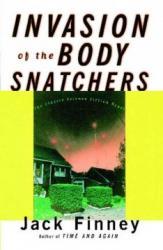
Most people know this book by its numerous film adaptations, including Invasion of the Body Snatchers (1956 and 1978), Body Snatchers (1993), and The Invasion (2007). In fact, I like to think that many facets of this story have become a part of popular culture, including the replication “pods” and Donald Sutherland’s scream in the 1978 film version. While the source material is inherently pulpy, a result of the genre and the era in which it was published, there is an entertaining quality to the story that has allowed it to survive for so long.
Simple in its execution, but brilliant in its reveal, The Body Snatchers builds up an inherent distrust of the people surrounding the main characters as they investigate why everyone seems “off” in this small, California town. While the full explanation of the aliens’ presence and purpose is relegated to an enormous information dump more than half-way through the book, it nevertheless contains some interesting ideas and concepts that could be plausible given the circumstances. I would have preferred better integration of this information into the plot, but sometimes the characters just need to sit down and explore these ideas in depth.
In the end, The Body Snatchers has plenty of strong moments in its plot. Sure, there’s the weaker section or two, and the more upbeat ending didn’t have much explanation other than the aliens’ annoyance of humanity’s persistence. Still, it’s a fun story, and even decades later it’s clear why The Body Snatchers is a timeless classic, even if it’s not “on par” with more significant literary titans. Maybe that’s its charm, though. By making it about the “everyman,” the horror and terror of everyone around them being replaced by emotionless beings is much more relatable on a visceral level.
A timeless pulp classic, I give The Body Snatchers 4.0 stars out of 5.
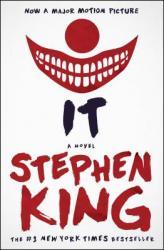
IT, is like no other when it comes to Stephen King classics. First, with the book cultivating a generation in 1986, then another with its film adaptation in 1990, and now, in 2017, with its revival. IT is timeless for thrill seekers who enjoy reading the horror genre. Stephen King craftly draws out the story for so long while keeping the audience captivated most of the time. Like any book, IT has some lengthy parts with extra detail that you could go without, yet I feel it adds to the story and the experience of reading the book. This book is highly recommended for attentive readers who are interested in a slow suspenseful story. The tone throughout the book is tense, and always seems to be building up to something creating thrill.
I was initially drawn to this book because I adore horror movies. I thought reading a horror book would give me the same sense of adrenaline. Boy was I wrong. Reading this book was scarier than any horror movie that I have ever sat through. Something about how Stephen King gives so much detail while still somehow leaving everything to the reader’s imagination is magnificent. I started reading IT just before the new movie came out in hopes of finishing it before I went to see the film. Yet, the book is so long I didn't end up seeing the movie the month it came out.
The story takes place in a rather odd town called Derry in the 80’s. It follows a group of misfit teens who are battling their worst nightmare. Their character development and growth as a child is phonomonel and continues as the characters return as adults to once again battle IT. The story takes place in two different time periods with the same characters and jumps between the two respectively. For me, however, it did get confusing at times, trying to keep track of if the characters were adults or teens while picking up where I left off. Other than that the book is consistent and addictive and I would highly recommend it.
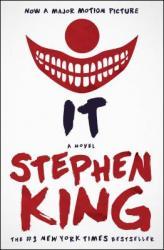
This novel follows the lives of five kids in a town called Derry. They bond together over their terror of It, an evil being that has a hold of their small town. They struggle overcome It with little support or understanding from the world around them. I choose to read this book because I knew the movie was coming out but being the book freak I am, I wanted to read it before I saw the movie adaption. I have to say after seeing both the old movie, the new movie, and reading the book, that the book was the most scary of the three. King writes with zero censor and hits on topics typically labeled taboo. The thing I like most about this novel was its ability to really impact me and make my skin crawl. Since its a horror novel “creepy” or frightening things are bound to be included but for me the most alarming parts of this book were some of the more realistic events such as spouse and animal abuse. This novel was not at all predictable, you just had to keep reading to see how the story would unfold. I know most people are set off by the size of the book but I have to say I never found myself bored or thinking that the parts King wrote were irrelevant. This was the first Stephen King novel I’ve ever read but I would definitely recommend it and will be reading more of his work. Due to the fact that the story was unlike anything else I’ve ever read I would say it's one of the best books I’ve read this year.
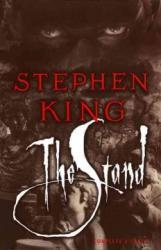
The book "The Stand" by Stephen King is a novel about a disease. It starts out at a gas station where the disease is first seen in the novel. This book has many different characters as it progresses. The main antagonist is the embodiment of evil. He is basically the Antichrist. Although I didn't like this book as much as some of Stephen's other works because I have a short attention span and some parts are not attention grabbing. It is still a very good book and I would definitely recommend it to anyone who likes horror. This novel is very unpredictable which is one of the main reasons I like it as much as I do. Because there are so many characters in this book, it was very easy for me to relate to their situations.
Reviewer Grade: 9
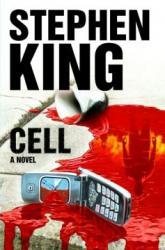
The book "cell" by Stephen king is a book about learning to cope with the apocalypse. The apocalypse in this book is very unique and diverse from your typical zombie virus outbreak. While the main character, Clay, is out getting ice cream he watches as people answer their phones. They all start going crazy after they've answered the call, spitting out nonsense and being extremely violent towards each other. He was the only person there without a phone. Through out the story new characters are gained and then lost. I liked this book because I have a lot of trouble finding books that grab my attention. I really enjoyed reading this book, it was very action filled. There were no dull moments. I chose to read this book because of hype around the movie "It". I really liked the movie so I decided to read some of his other work. I would recommend this book to anyone who like very exciting, sad, emotional, and/or mysterious novels.
Reviewer Grade:9
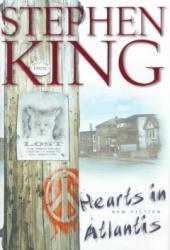
When I started Hearts in Atlantis, all I knew about it was that it was written by Stephen King and there was a movie of the same name that was likely based on it. As I began to read, I found myself enthralled by the coming-of-age story that presented itself. I had no idea it connected to the Dark Tower series, but that detail was almost ancillary, a neat little connection into a bigger picture. Having made it half-way through the book, I wanted to follow the main character’s development into adulthood but, then the story suddenly stopped.
Instead of following a story that had engaged me, the focus shifted to a completely different character, only loosely tied to the events in the first half of the book via one of the characters, who was now in college. Almost in a fractal fashion, this story was half as long as the first, with each successive story growing shorter and shorter, while still being connected to the first narrative in some way, no matter how loose that connection might have been. Finally, the story returns to the main character of the first section, but only stays long enough to say goodbye.
I absolutely loved the first story in this “collection,” and by its strength alone, I would recommend this to anyone. However, the second half of the book felt too disjointed to be interesting, especially with all the emotional energy I had invested in the first story. Sure, they were somewhat interesting in their own ways, showing the relentless march of time toward the modern era, but they simply lacked that fantastical little spark from the first story (incidentally, the same spark that was connected to the Dark Tower series).
A great story with almost unnecessary add-ons, I give Hearts in Atlantis 3.5 stars out of 5.
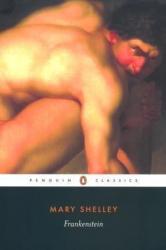
Mary Shelley's Frankenstein is a book about the horrors of creating life. The book succeeds in developing most of the sidecharacters. You learn in depth about all of their pasts, and the story fits together well. The tragic plot line of the book shows how the decisions made by Frankenstein, the creator of the monster, comes back to haunt him. It almost becomes a game of cat and mouse when Frankenstein chases around his creation for revenge when really, the monster is haunting Frankenstein for his own revenge. Most of the book's themes include loneliness and rejection, and are explained well throughout the back stories of the characters. I feel that the book's only weak point is how the characters face their end. While the characters do indeed learn many life lessons, they never really accomplish anything. None of the characters have sentimental deaths, other than Frankenstein; the book just tells the reader that the character you have just grown attached to...well, dies. The book moves on from their deaths, and then the cycle repeats for the rest of the book. Overall, Frankenstein is a really good book, and I'd recommend it to people that like horror or mystery fiction.
Grade: 8
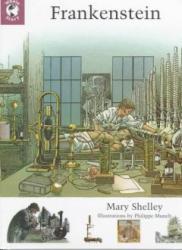
Frankenstein was a disappointment to me. As per the Romantic period, this novel used lots of scenes in nature to explain the characters’ emotional states. I do not mind a few good cries in a storm, but this novel borders on incessant outdoor melodrama. I decided to disregard both the plot and the setting in a vain attempt to enjoy the novel. I would only focus on the characters. As this was written by a female author, I looked forward to the female characters, which were awful. One, Justine, is a servant and seems only to exist in order to die. Elizabeth, who also seems to share this quality, is regarded as an object to be owned in a creepy incestuous manner by her cousin; she is apparently superior and virtuous only because of her noble birth. So, I dismissed the female characters to focus on the males, none of which were believable. Victor, his friend Henry, and his monster all were overly emotional, and they inspired no sympathy from me. With no likable characters and emotions running everywhere, I would only read Frankenstein if required.
Reviewer Grade: 9
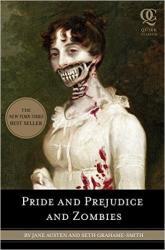
Back in the zombie heyday of 2009, the idea of combining one of the most feminine pieces of literature with the oft masculine-marketed gory violence seemed like an interesting idea. I, for one, didn’t particularly care to read Jane Austen’s Pride and Prejudice , but this take on the romantic classic certainly piqued my interest. Because of the addition of zombies to this plot, I was impelled to read this story to see how these drastically different archetypes were combined. I certainly wonder if the book would have been more enjoyable if I had read Pride and Prejudice beforehand, or if I would have remained far abreast of it altogether.
Partly due to the severe dichotomy of the original story and the zombie additions, there were certainly moments where I could tell what segments of Jane Austen’s plot were modified to fit the new, apocalyptic sensibilities.
The two concepts worked together somewhat, occasionally adding action to a scene that would have likely been boring in its predecessor, but in maintaining the story and outcomes of the original, the whole experiment didn’t quite “gel” as it could have. Perhaps the addition of the prequel and sequel to this book helps to round out these distinct edges, but I have yet to read those books yet.
When it comes right down to it, I struggled to get through this book. With the language and verbiage retaining is feel from the original, the archaic nature of the dialogue was not as easy to read as I would have hoped. In the end, I was practically just reading Pride and Prejudice, but occasionally “changing the channel” to a zombie film whenever anything became boring.
I applaud Seth Grahame-Smith for following through on this ambitious idea, but it almost seems like anyone could easily merge zombies to a romantic classic if they maintain the majority of the source material.
An intriguing idea that never quite fully “connects,” I give Pride and Prejudice and Zombies 3.0 stars out of 5.
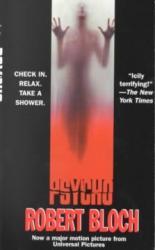
Once again, I find that the source material on which a famous movie is based is equally as good and equally as famous. What strikes me as interesting is that the quick turn on some of these literary masterpieces from page to screen has largely remained unchanged. Gone with the Wind only took three years before its film debut, The Martian took four years, and Psycho only took one. Clearly, these stories are practically screaming to be made into movies, and most have done quite well as the cultural icons of their age.
Of course, having already seen the film on which this book was based, I was well aware of the twist ending. Nevertheless, reading through this book was almost enhanced by this a priori knowledge as one would probably not have guessed the twist if they were reading it for the very first time. There are just little hints here and there that something is off, but it’s not until close to the end that we find out that everything is not as it initially seemed. Even the visuals provided in the film version helped to aid my imagination in establishing the setting and characters.
And yet, as there always is, there are some differences in the book that did not make it into the movie. I wonder if Norman Bates was made a lot slimmer in the film partly due to Hitchcock’s portly frame. In the book, his overweight body adds a layer to the character (both literally and metaphorically) which helps flesh out (Har har. OK, I’ll stop) more of the explanations as to why Bates ended up this way. Much like One Flew Over the Cuckoo’s Nest, being able to get into the mind of Norman Bates was a fascinating examination of someone with a severe mental illness.
A fantastic read equally on par with the Hitchcock classic, I give Psycho 5.0 stars out of 5.
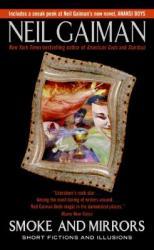
As someone who has to read many short story submissions for the anthology my writing group puts together each year, I can appreciate a well-written short story. I have not read much of Neil Gaiman, but in his collection of anthology short stories, Smoke and Mirrors, I was able to see what kinds of stories a professional writer writes for an anthology. While quite a few stories were interesting, not all of them were necessarily in genres I typically read. Then again, I consider erotica and stories submitted to Hustler as pornography, which is why I do not read these kinds of short stories.
Furthermore, it is a little more uncomfortable listening to erotica, as was the case with this audiobook. Fortunately, Gilbert Gottfried did not read it, but it still is uncomfortable to hear it nonetheless. Sure, the concepts in these short stories were somewhat interesting, but the sex ruined it for me. At least there were enough other stories that I found fascinating to make it worth my while to get all the way through it. The simplicity and genius of these ideas merely verify Gaiman’s writing talent, even if a few were hard to follow. At least a few of them followed the title of the book, which helped tie these separate stories together.
Perhaps my biggest qualm with this book was its structure. Moreover, maybe it was a limitation of a direct transferal to the audiobook format, but it is almost impossible to go back to the first section of the book and listen to the intro for each story before reading that story. Instead, it dispensed pertinent information on every short story before I even had a chance to get to them. If I were to appreciate each story fully, it would have been better to introduce each one with background information, so the context is fresh in the listener’s memory.
A collection of well-written short stories, I give Smoke and Mirrors 3.5 stars out of 5.
For more reviews of books and movies like this, please visit www.benjamin-m-weilert.com
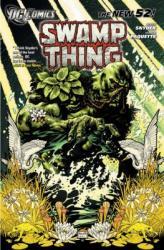
"Swamp Thing: Volume One, Raise Them Bones" is the beginning of Scott Snyder (author) and Yanick Paquette (illustrator)’s visceral, mythic run on the comic, which I recommend heartily to fans of horror/grotesque gothic stories.
Detailing the eternal conflict between the Green (plant life), the Red (animal life) and the Rot that would consume and twist everything, Snyder’s interpretation of Swamp Thing is full of haunting imagery and interesting worldbuilding. Later on, the comic run is taken over by Charles Soule, who does a lovely (albeit very different) job carrying on the story.
For now, though – renowned botanist Alec Holland has been chosen by the Green to shed his humanity and become their knight. Will he go willingly? And what will become of him now that he’s been claimed, whatever he chooses to do?
Warnings:
-- This book is suited for older audiences, in my opinion, and definitely not children. The illustrations are often what one might call “graphic.” Be warned. It is something of a horror comic.
-- If you like this first volume and keep on with the series, just know that during the Rotworld arc, "Swamp Thing" crosses over with Jeff Lemire’s "Animal Man." It may behoove readers to pick up "Animal Man: Volume Three, Rotworld," at least, in order to get a complete look at the story. :)
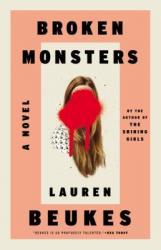
Broken Monsters is a thriller set in Detroit in which a detective investigates a serial killer who murders people with a nail gun and then attempts to meld their bodies with those of animals -- or at least, that's how it starts out. The chapters rotate between the perspectives of Gabriella Versado, the detective investigating the case; Layla, her teenage daughter (currently embroiled in a plot to lure out and expose pedophiles); Jonno, a journalist who quit his job and moved to Detroit to reinvent himself by reporting on their art scene; TK, a homeless man working to protect his friends and community; and our serial killer, who finds himself infected by a dream that seems to have the power to rewrite reality itself. While it initially seems like a pretty standard thriller, the murders quickly veer off into the realm of the supernatural. The book is a bit uneven as a result, ending up as a mix of magical undertones plus serial killer crime investigation plus family drama that never quite came together for me. The writing wasn't amazing by any means, but it got the job done, and the plot managed to keep me turning pages. Despite having heard some rave reviews from others, I wasn't wowed by it, but if you're a fan of horror/thrillers this is definitely unique.
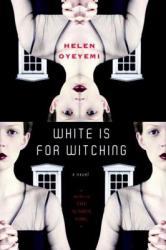
White Is for Witching is a difficult book to describe. I suppose you could say that it's the story of a young woman, Miranda Silver, who suffers from pica, a condition which compels sufferers to crave and eat inedible foods: chalk, plastic, metal, rubber. The story follows her life -- loosely -- from her mother's death when she was a little girl up until her mysterious disappearance in her late teens/early 20s. The story is told from the perspectives of Miranda, her twin brother, her college girlfriend, and the (possibly evil) house/bed & breakfast she lives in, along with a few brief POV sections from side characters. They're nominally piecing together the events that led up to Miranda's disappearance, but that thread often gets lost in the meandering chapters. Fair warning: the plot is difficult to follow and it wasn't until I reread the opening that the story started to click into place. There's a strange, dream-like atmosphere, none of the narrators are anything close to reliable, and it wasn't always clear to me (read: it was almost never clear to me) what was going on. To give a sample of just a few of the plot threads: There are a string of assaults/murders of refugees happening in Dover, England, where Miranda and her family live. Is she connected to them somehow? Some passages seem to suggest so, but we certainly never find out. The house she lives in seems to hate immigrants and may or may not have eaten her female ancestors to keep them from leaving, but don't expect either of these points to be brought to any sort of conclusion. The closest thing to a central thread was the obsession with the possibility that Miranda was or was controlled by a soucouyant, a sort of vampire/shape-shifter in Caribbean traditions. So race, identity, and immigration are obviously big themes, but it's less clear where Oyeyemi is going with everything.
For me, the actual story-line wasn't very satisfying, but the writing style and atmosphere made it worth it. I've read almost everything Oyeyemi has written, and a lot of her stories fall apart at the end; she's great at creating interesting characters/evoking an eerie, ominous mood, but in my opinion resolving a plot is not her strong point. This might be frustrating for some readers, but if you're interested in something a little more experimental and don't mind that it's a bit rough around the edges, you might like this book. I would recommend Oyeyemi's first book, The Icarus Girl, for anyone interested in reading something a little more accessible by her. If this had been the first thing I read by her I might not have picked anything else up, but I enjoyed it for what it was.
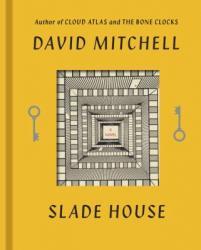
Such a great story, and only 238 pages! I bought this book in an airport since I forgot to bring anything to occupy my time on a long flight. Boy am I glad I did! I could not put the book down until I finished it! Interesting tale, set over many decades, with notable references to eras that made it easy to get lost in the story. If only there were more of the story to read!
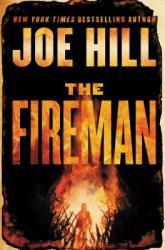
The world is burning, one person at a time. A new sort of plague, a spore known colloquially as Dragonscale, is infecting hundreds of thousands around the globe. It begins with something small. It gets into your head. It grows. You feel fine until you see it on your skin-a small stripe, like a gold-flecked stain. You might even mistake it for a bruise at first. But then you know you have it. You know that you’re going to burn, and it’s only a question of when. No one knows exactly how it spreads, and there’s no sign of a cure short of being killed before you ignite. You’ll smoke a bit first, and then you’ll combust, unless someone decides to end your life before then.
In the midst of the chaos is Harper Willowes, a Portsmouth nurse who sincerely wishes for nothing more than to be able to help others through the crisis. She volunteers her services caring for the infected while her husband Jakob works for the Public Works Department, helping to clean up the devestation left behind by the burning infected. It’s at work that Harper first meets the Fireman. He brings a child in for treatment, not for the Dragonscale covering him, but for a ruptured appendix. After the boy, Nick, is taken in for surgery, the Fireman vanishes. A few days later, Nick is gone as well, leaving only questions in his wake. Then, disaster strikes and the Portsmouth Hospital burns to the ground. Harper escapes, but soon makes two discoveries. She’s pregnant and she has the ‘scale. Believing himself to be infected as well, Jakob snaps and Harper is forced to flee for her life and that of her unborn child.
When all seems lost, the Fireman intervenes. He rescues Harper from Jakob’s pursuit and secrets her away to a small camp where over a hundred and fifty infected are living in hiding, including Nick. Living and thriving, to Harper’s great surprise. While there’s no cure for the spore, the people of the camp have found a way to live in harmony with the Dragonscale, under the leadership of Nick’s grandfather. Harper’s medical skills quickly make her indispensable. The camp, however, is no paradise. As panic grips the nation, marauders seek to eliminate any infected. Harper only wants to survive long enough to deliver her baby, but internal power struggles in the camp threaten to expose them all to the roving Cremation Crews. The Fireman may be the only one who can save them all, but he hides a dark secret of his own.
Joe Hill takes on an apocalypse of his own, one that rivals The Stand in scope and violence (not to mention pop culture references). As the world around them burns, his characters must face the fact that other humans may be a greater threat to them than the Dragonscale ever was. The Fireman is a hell of a ride from beginning to end, and is every bit as intense as the flames it evokes. Go check it out.
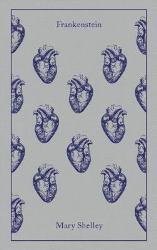
This book definitely isn't like the movies, but it is still really interesting to read. The main character, Victor Frankenstein, goes through a lot of crazy times. He creates a so called monster by many and everything that comes after keeps you wanting to read more. There is a lot of melancholy feelings and struggles that many go throughout the book. It uses a lot of diction and has foreshadowing throughout giving you hints here and there of what might come. I highly recommend this book because it's a very cool story.
Reviewer Grade: 12
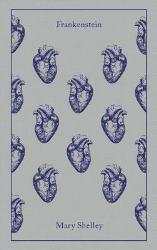
Frankenstein begins with Robert Walton, an explorer, writing letters to his sister about his journey to the North Pole. Along the way, he rescues a man named Victor Frankenstein from an ice drift. The story follows Frankenstein down memory lane as he tells Walton about his pursuit for knowledge and the deadly consequences that followed.
I really enjoyed this book. I've always been meaning to read it, so I'm glad that I finally did. I loved how it was written; the characters were highly intelligent, and the word choice did an excellent job of showing it. The only thing that I wasn't so huge on was the end. It felt a bit too abrupt to me. Regardless, I found this to be an excellent book.
Reviewer Grade: 12